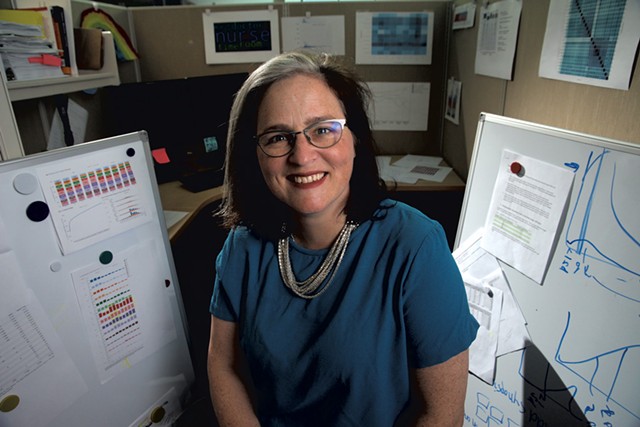
- Matthew Thorsen
- Alison Cossette
Name: Alison Cossette
Town: South Burlington
Job: senior business and process improvement analyst, Center for Health Care Management, University of Vermont Medical Center
Officially, Alison Cossette is a data analyst for the University of Vermont Medical Center. Unofficially, she says proudly, "I'm the resident data nerd."
The 45-year-old mother of two is passionate about statistics. "Being able to kind of sift through and find the needle in the haystack of the information that we actually need," she says, "I get very, very excited."
Cossette says she's always been analytical, but she only recently launched her data-science career. After graduating from Colchester High School in 1989, she moved to New York City to attend New York University; she earned a bachelor's degree in music. She spent a few years managing artists, and then tried investment banking. That ended after 9/11, when Cossette says she felt moved to do something to help others. For 10 years, she worked primarily with oncology patients as a lymphedema therapist and educator.
When she and her husband moved back to Vermont in 2013 with their two young boys, Cossette switched gears again. She enrolled in online programming classes at Champlain College and started learning the computer language Python through a class offered by the nonprofit Girl Develop It Burlington. For the summer of 2015, Cossette and her family relocated to New York City so she could complete a 12-week data-science boot camp. In January this year, she landed the job at UVMMC.
Now Cossette uses her analytical mind examining the health network's data on a big-picture level — for example, combining patient, location and population data sets to anticipate future demand for services.
Though Cossette's work affects patient care, she rarely sets foot in the hospital. Seven Days spoke with her from the Center for Health Care Management office in South Burlington's Technology Park. A magnetic whiteboard covered with multicolored charts and graphs leans against the back wall of Cossette's cubicle. On the outside wall is a sign that reads, "Keep calm and let the data analyst handle it."
SEVEN DAYS: What are you working on right now?
ALISON COSSETTE: I've spent most of my year doing workforce modeling. So, how many gastroenterologists do we need? Do we need them in New York State? Do we need them in Vermont? What does that demand look like? Short answer: figuring out how many doctors and what kind do we need where throughout the entire network over the next 10 years.
SD: To do that, you're looking at clinical data from the hospital, as well as population data, and trying to model it?
AC: Exactly. That's what it is. To build the model, and to understand not only what is happening right now, but what is going to happen in the future, and how do we prepare for that. And how do we make sure that we have enough people to provide the quality of care that is demanded throughout the region, so that you don't have to wait three months or nine months to get in to see somebody, ideally.
SD: What does your typical day look like?
AC: I spend a lot of time doing what we call exploratory data analysis.
SD: What does that mean?
AC: If you talk to any data scientist, they'll tell you that 80 to 90 percent of their job is just getting to the point where they have a functional data set. In a health care setting, we have many different systems where we're sourcing data — everything from our registration system to our clinical electronic health record systems to billing systems. In order for me to paint a picture that makes sense, I need to be able to get data from those places and connect it accurately in a way that's meaningful. I have to understand all of the ways that the information gets in.
When someone comes into registration, what does that process look like? Which questions are being asked? What does it mean when you say they live in the city? Is that where they actually live? Are they there just for now? Are they there permanently? I have to understand not only what the words at the top of the column in the data warehouse mean, but also the history of how that data got there, to know what it means in practice.
SD: What advice do you have for other people considering a career change?
AC: To change your career over 35, it's totally doable. If you want to become a programmer, if you want to become a web developer, you don't have to be 19 years old. You don't necessarily have to have any background in it. You just have to find a way to do it that works for you.









Comments
Comments are closed.
From 2014-2020, Seven Days allowed readers to comment on all stories posted on our website. While we've appreciated the suggestions and insights, right now Seven Days is prioritizing our core mission — producing high-quality, responsible local journalism — over moderating online debates between readers.
To criticize, correct or praise our reporting, please send us a letter to the editor or send us a tip. We’ll check it out and report the results.
Online comments may return when we have better tech tools for managing them. Thanks for reading.